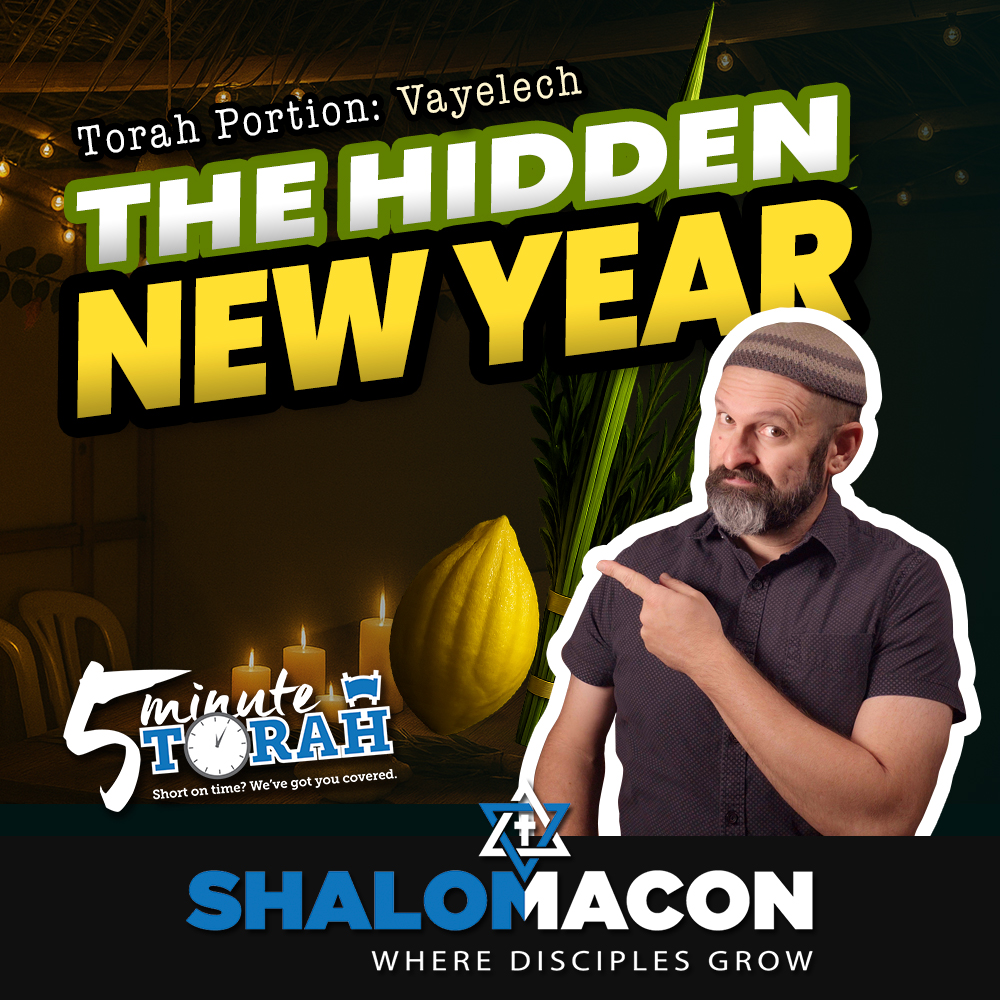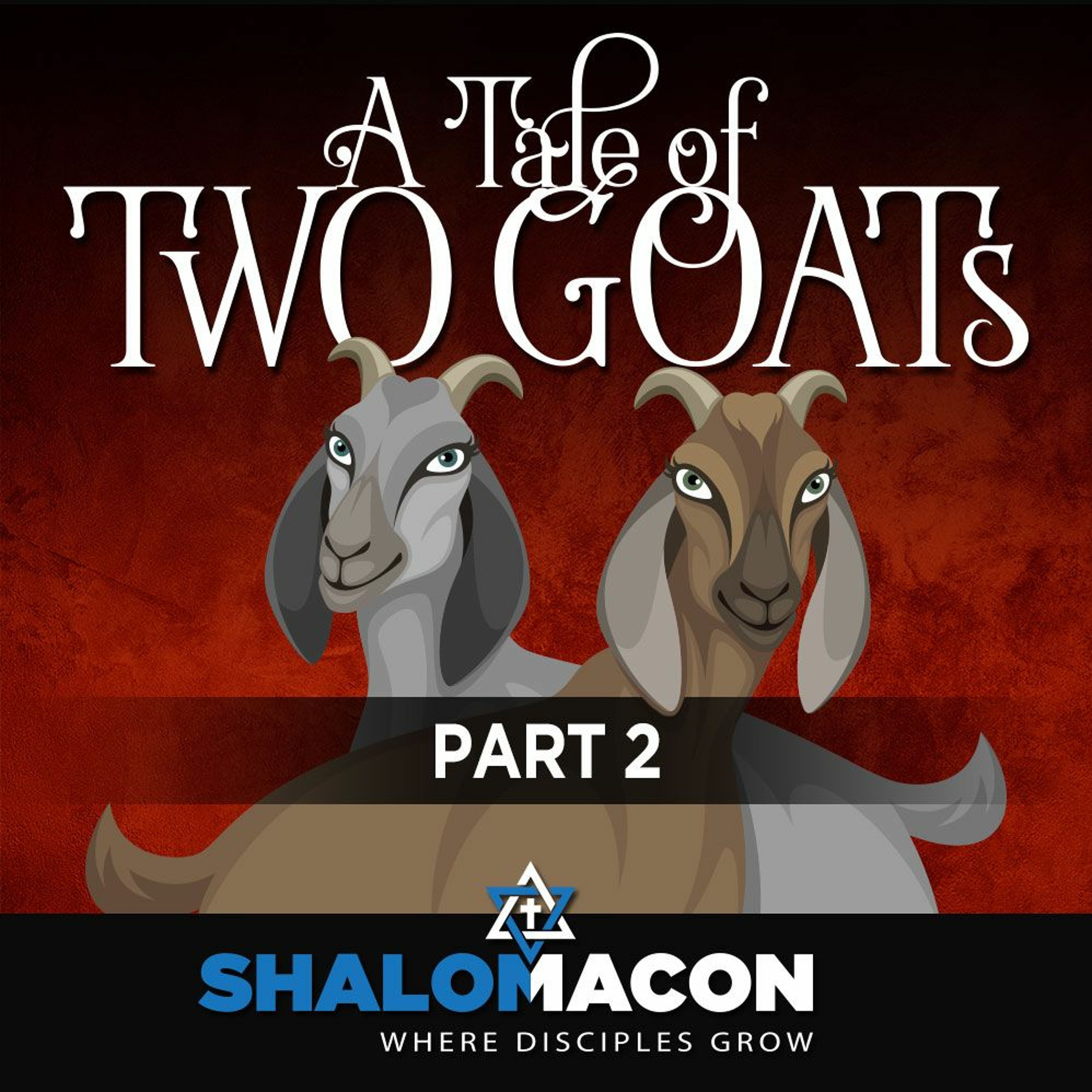Episode Transcript
[00:00:00] Can the very first word of the Torah hide a secret about the creation of the world? Some, like the BAAL Hatturim, suggest that if we rearrange the letters of the word b'reisheet, we discover a hidden clue about the exact date when creation began. What is this mystery and what does it have to do with Sukkot and the public reading of the Torah? Join me and find out in this week's five Minute Torah Shalom and blessings from Shalom Macon, the where disciples of Yeshua learn, connect and grow. I'm Darren. And before I get into the five minutes of my five minute Torah commentary, let's cover a few quick facts about this week's Torah portion. This week we are studying the 52nd portion of the Torah cycle and the 8th portion of the book of Deuteronomy. We are in the portion of Vetchanan. Wait, wait, wait, wait, wait. Did I just say Vetchanan? No way. We are in the portion of Vayelech. Deuteronomy 31:1, 31:30. And here are the three things that you need to know about it. Number one. Moses. Final day Passing of the torch. Bayelik records Moses on the last day of his life. At 120 years old, he knows his mission is complete. But Israel's story is just beginning. Before his departure, he strengthens Joshua in front of all of Israel and publicly commissions him and as their new leader. This powerful moment reminds us that while human leaders may come and go, God's mission continues throughout each generation. Number two. Be strong and courageous. Chazak v'. Emmaz. Both Joshua and the nation of Israel received the powerful command Chazak the Emmatz. Be strong and courageous. They're about to face battles, uncertainties, and the unknown challenges of the land. But God assures them of his very presence and every step of the way. This is a timeless encouragement for us as well. When God calls us forward into uncharted territory, he also promises to walk with us, never leaving or forsaking us. And number three, Torah for all generations. The Hakhel Gathering. Moses writes down the Torah and gives it to the Levites to place near the Ark of the Covenant. Then he commands that every seven years during Sukkot, the entire nation, men, women, children and even foreigners should gather to hear it and read it aloud. This Hakhel ceremony ensures that God's word will continually shape the lives of his people. It reminds us today that the Torah is not reserved for scholars alone, but it's meant to be heard, studied, and lived out by every generation.
[00:02:41] What does it really mean to live by the Spirit of the Law and not the letter of the Law? For centuries, believers have been told that the law of God is a burden and something you should came to set us free from. But what if that's not what the Scriptures say at all? What if Paul's words about the letter of the law killing were never meant to pit God's spirit against his own commandments? If you've ever struggled to reconcile law and grace, Spirit of the Law will open your eyes to a richer, more faithful understanding of both. It will challenge assumptions, bring clarity to misunderstood passages, and invite you into a deeper walk of of obedience, one that's alive with the Spirit of God. Pick up your copy today and let the Spirit of the Law transform the way you see God's Word and the way you live it. This week's Torah commentary is called joy at the year's renewal and comes from my book 5 Minute Torah, Volume 3.
[00:03:35] Our current Torah portion is primarily focused on the transfer of leadership from Moses to Joshua. But we also learned that Moses has finished writing the Torah and places it in the charge of the kohanim, the priests. He then charges them to read it in its entirety at a specific time each year at the end of every seven years at the set time in the year of release, at the feast of booths. This is Deuteronomy 31:10. At first, this may seem to be a simple statement. In the year of the Shmitah, the seventh year of rest, you are to read the Torah during Sukkot, the feast of tabernacles or booths. However, there's more implied in this statement in regard to the time when this occurs. What is the connection between Sukkot, the end of the year, and the reading of the Torah? First, let's see if there's a connection between Sukkot and the end of the year. Many in the Hebrew Roots movement flatly reject the Jewish observance of Rosh Hashanah or Yom Teruah, as it's known in the Scriptures as a biblical New year? Because Exodus 12:2 says the Hebrew month of Nisan is the beginning of the year. At first, it seems they are correct. Why would we say that Rosh Hashanah, the first first day of the Hebrew month of Tishrei in the fall, is the new year, when the Bible says that it's the first of Nisan in the spring? The answer is that Scripture itself recognizes at least two biblical new years to support this concept. Exodus 34:22 says you shall observe the feast of weeks, the first fruits of the wheat harvest, and the feast of ingathering. In other words, Sukkot at the year's end. But this may not be strong enough proof because a more accurate translation of the last part of this verse is at the year's turning. Since Sukkot is a little more than six months away from the first of Nisan, it may seem this is only referring to the time when the year is passing the halfway point and turning back toward Nisan. However, a Parallel verse, Exodus 23:16, specifically mentions Sukkot being at the end of the year. Thus we have the religious New Year beginning in Nisan and the civil year beginning on the Tishrei. An interesting side note is that the very first word of Genesis 1:1 in Hebrew is b'reisheet, which means in the beginning. However, like that BAAL Haturim and others have suggested, the letters of b'reisheet can be rearranged to say Aleph Betishrei, meaning on the 1st of the month of Tishrei, signifying that the very creation of the world possibly began on the first of the Hebrew month of Tishrei. Now that we understand the month of Tishrei being a biblically recognized turning of the year, we need to understand the connection between Sukkot and the reading of the Torah. First, Sukkot was a multifaceted week long festival that not only commemorated the wilderness experience of the children of Israel fleeing Egypt, but it also coincided with the end of the wheat and grape harvest. The wheat harvest was completed and a new supply of wine was either freshly made or soon to be ready for consumption. Because of this, it was naturally a time of joy and celebration. Therefore, the Lord actually commanded the children of Israel to be happy at this time. He said, you will be altogether joyful. Deuteronomy 16:15 this translation smooths out the original Hebrew a little too much. A more literal translation would be you will only be joyful. This is the only time in the entire Torah that we are commanded to be joy joyful. But sometimes, when thousands of people have made a pilgrimage to Jerusalem and are celebrating for an entire week with an abundance of food and wine, levity can override good judgment in regard to moderation, and moral propriety can fall by the wayside. What's the solution? It is to remind Israel of what God expects from his children. Therefore, the Torah is read in its entirety throughout this week long celebration. Because of this, a tradition arose to begin and end the year long Torah reading cycle. During this time, the minor holiday of Sinhat Torah, Rejoicing of the Torah commemorates this tradition. How does all of this understanding apply to us? It may apply differently for different people. Maybe you've never commemorated Rosh Hashanah because you were told that it was a rabbinic deception to mask the true Biblical New Year. If that's the case, it would be a great start to recognize Rosh Hashanah this year in some capacity. Maybe you've never celebrated Simchat Torah. Maybe this year you can start studying the Torah on Simchat Torah and complete it next year. At the same time, maybe you haven't truly been joyful during this time and now realize the importance of being in charge of your feelings, especially during this season. There are many things we can do to apply this new understanding to our lives. What will you do with it? We love to hear the words Jesus loves you. But what happens when that love calls you to surrender the very thing that you hold most tightly? That's the challenge Yeshua gave the rich young man. And it's the same challenge that still confronts us today. If you're ready to dig deeper into what Messiah's love really demands, click the link right here.



